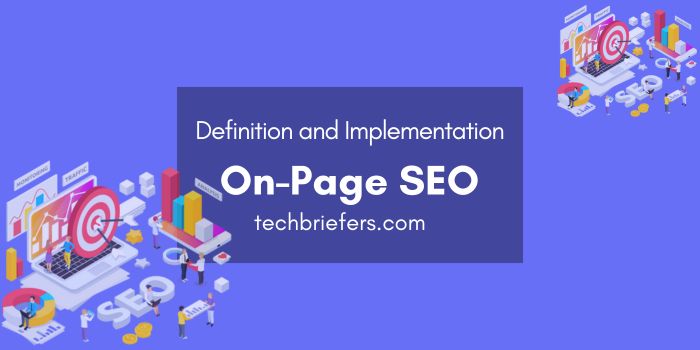On Page SEO: Definition and How to Implement It

Organic search from search engines is arguably the largest source of traffic on a website. However, the possibility of getting clicks from users depends heavily on your website’s ranking. One of the most important things to do is optimize so that your website can get the best ranking in SERP. Until now, the most effective SEO strategy is to optimize from the on-page SEO(On page SEO) side.
On-page SEO strategies focus on improving the content of the website, such as the use of title tags, meta descriptions, meta keywords, and URLs. In this article, I will discuss what on-page SEO is, and why optimization is very important for audiences and search engines to improve your website’s search ranking on Google.
On page SEO is the practice of optimizing content on a website page to maximize its visibility in search engines. This optimization ensures that search engines can easily comprehend the content on our website page. So, our website can be displayed on relevant search queries.
On-page SEO strategy is based on the arrangement of content on the page, such as improvements to the title tag, description, and keywords to the permalink settings that we apply. So it is expected that the crawler on the search engine can find out the contents of our website and can categorize the page correctly.
Why is On Page SEO Important?
There are currently over 1 billion websites, which means Google’s algorithm has to sort through huge amounts of data in order to organize website content and present what is most interesting to users.
By optimizing your website pages, you have helped search engines to understand the contents of your website or content as a whole, so that search engines can place your website content according to the relevance of the targeted query.
For example, Google has updated its algorithm to find and penalize duplicate content, encouraged sites to prepare mobile versions, and emphasized the importance of security on websites to demonstrate a commitment to security in its search results.
Also Read: 10 Ways to Optimize On-Page SEO to Increase Website Traffic
How to Optimize On Page SEO
There are several things you can do to optimize your website’s search results in Search Engines. Here are some on-page SEO strategies you can do:
1. Understand Google’s criteria
Before optimizing a website, first understand how Google’s algorithm works. There are several things that Google cares about, such as speed, security, and content quality.
In terms of speed, your website is required to be accessed quickly. Therefore, you must optimize the server and website content, so that the load is lighter so that users can access it faster.
As for security, make sure that your website is secure or uses an HTTPS link. Google ensures that the top search results are filled with secure websites.
Lastly is content, which is the most important assessment. Google demands that you present the best content. Starting from the title, content, and images to keywords must be complete and relevant. In addition, it is a very high recommendation that your website supports multiple devices. That means the website should be responsive, making it easier for users to browse your website content from various devices.
Also read the article: Google Trends: Definition and Benefits
2. Keywords
Keywords are one of the things that determine SERP results on a website. Do keyword research and help search engines find out important words on your website. Google provides at least two tools that you can use, to do keyword research. These tools are Google Keyword Planner and Google Trends. You can also use other SEO tools such as Ahref or SEMrush for keyword research.
After getting the right keywords. Make sure the main keywords appear in the title, description, URL, and the first paragraph of the article you write. Having keywords in the first paragraph will allow you to explain the purpose and topic from the start to search engines and readers.
3. Title and Subtitle Settings with Headings
The placement of H1 and H2 tags helps search engine crawlers to know the title and hierarchy of the content you create. Make sure the title uses the H1 tag and only appears once in 1 article. While you should use H2 in sub-headings that provide important clues about the material you are discussing.
The most important thing to remember is that the H1 tag should only be present once in each article or page, not more than once. While H2 or its derivatives can be present more than once in each article.
4. URL optimization
The URL structure of a website page provides many benefits for SEO. Specifically, you can create a URL by including keywords in it, so that the topic you create will be clearer and make it easier for search engines to display the right keyword relevance.
Both search engines and your website users will feel more confident, knowing the topic of the page you are presenting. This can encourage search engines to place your website on the SERP according to the keywords you are targeting.
For example, if you have the keyword ‘dubai tour packages’, then make the website URL https://domainname/dubai-tour-packages.
5. Add Internal and Outbound Links
Internal links serve to provide information to search engines, that the article you created involves other pages on the website. So that search engines can map and analyze, which pages are the main ones and which are the supporting pages. Adding internal links is highly recommended because it can increase the search results of the main page you are targeting.
Outbound links are required if the article you create is sourced from another website. In other words, the inclusion of outbound links for content that takes sources or references from other sites is an obligation. Because it has become a norm and ethics that are mutually agreed upon.
6. Optimize Title Tag and Meta Description
Title tag or title is one of the most important components in on page SEO. The title provides information about the content you create and makes it easier for Google to determine SERP search results. The suitability of keywords, titles, and descriptions on the website will increase the SEO score on your website.
Therefore, make sure that the keywords you are targeting appear in the title tag, meta description, and URL of the content you create.
Also read: Top 15 Cheap, and Free SEO Tools to Analyze Your Website
On page SEO is a foundation for building a strong site and the best search results in SERP. It is hoped that with this strong foundation, your website can easily enter the highest ranking of the Google search engine.
From all the points we have conveyed above, sometimes we are still confused to determine which one needs to be optimized first. To make it easier for you to determine the optimized page, you can use the SEO Tools I have listed here in this article.







Leave a Reply